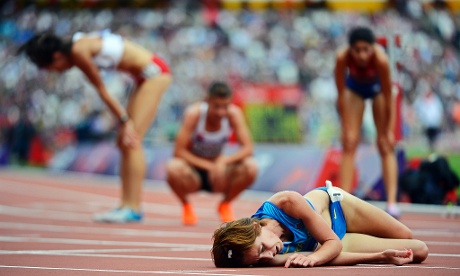No puke, no gain?
We were reading this interesting blog post about working out to exhaustion, and how it seems to be the current trend among many fitness enthusiasts. We would encourage you to read the post, but the long and short of it is that you don’t need to work yourself to death just to get in shape and stay fit.
And since the vast majority of us here are runners, we strongly support that point of view. Years ago, when today’s Generation X’ers were high school cross country and track runners, some of those old school coaches might have had the no-puke-no-gain approach to workouts. Today, however, that is not the case in the running community and with most coaches. In fact, many say that rest is just as important as nailing a key workout.
With that in mind, here are several thoughts on this current mentality as it applies to our favorite sport of running.
Becoming a better runner doesn’t just happen
If you want to get faster, stronger and better at running, if you want to finish first in your age group or win a race, you have to work at it. There’s no doubt about that. You need to put in the miles with easy running (80 percent of your miles should be at an easy, conversational pace). Then you need to add in some speed work, whether that’s on the track, doing fartleks or doing hill repeats. You need to push yourself on those and challenge yourself mentally and physically. When you do, you will see improvements in your performance.
Sometimes it feels like you’re pushing beyond your limits
Running is hard, and that’s particularly so when you’re just starting. When you’re gasping for breath, and you have a side stitch, and you say to yourself, “I feel like I’m gonna die!”, you are pushing your body to its limits. The thing is, running gets a little easier. Every time you push yourself, your body is getting accustomed to the hard work. As we’ve heard one varsity high school cross country coach tell his runners, “Watch out! You just might get in shape!”
But that doesn’t mean puking
You don’t need to puke to get in shape. You just want to push the limits of what you’re able to accomplish. For instance, let’s say your training schedule has you on the track to run 6×400 repeats. When you recover from that sixth one, you at least ought to feel like you could do another one. This is true for any workout that includes repeats, whether it’s on the track, a fartlek on the rail trail or hills. Don’t kid yourself, though: The workout should be hard, and you should find it taxing.
Rest and sleep are just as important as the hard workout
Training hard breaks down your body, from working your muscles hard to even compromising your immune system. That’s why rest and recovery are just as important to your running as the running itself. Many experts also stress the importance of getting at a quality night’s sleep. Both the rest and the sleep will help you overcome the fatigue that can accompany training for a race. Resting up can help you to avoid injuries, and it also can help your mental game, too.
